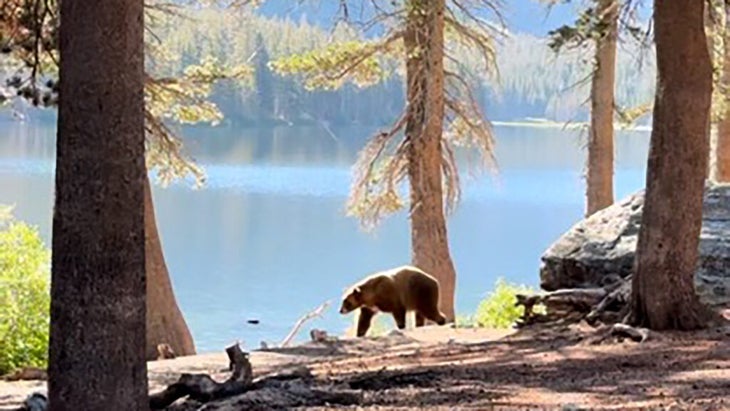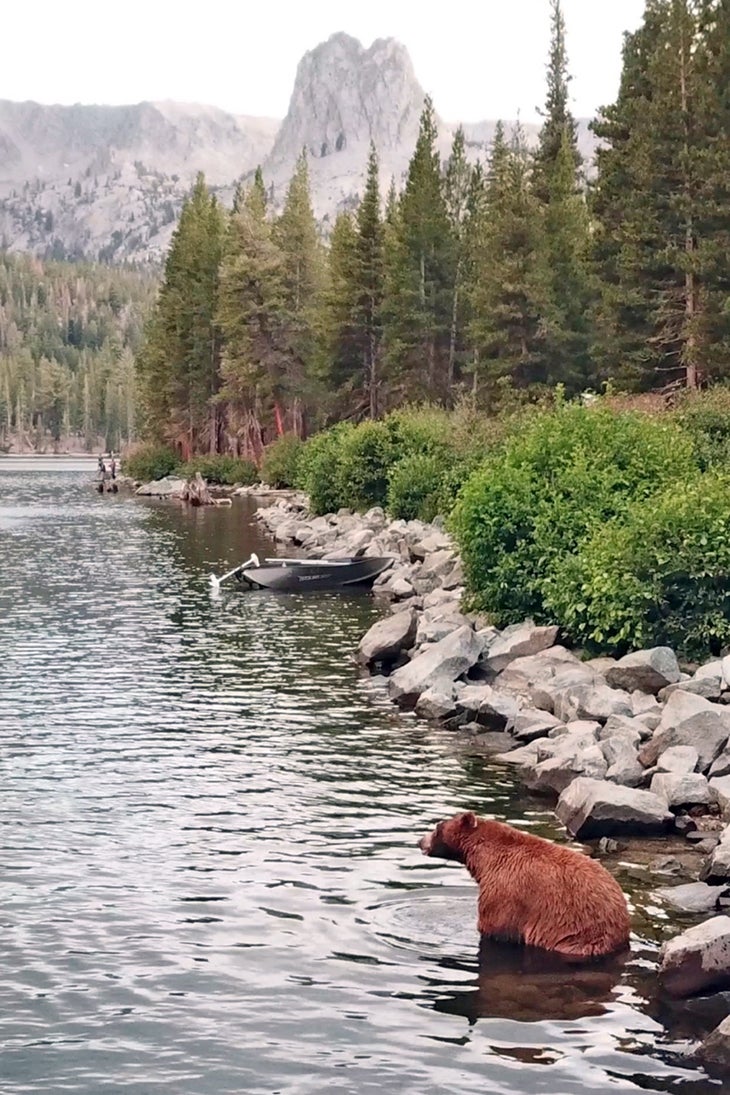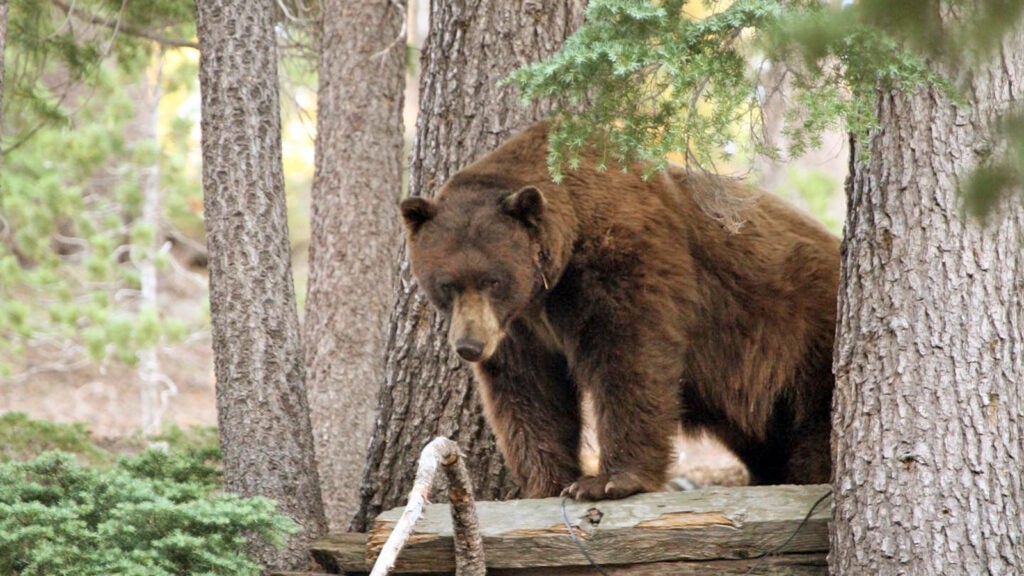No products in the cart.
Outdoor Adventure
A Beloved Bear Was Killed Due to Irresponsible Campers
The night of August 22 began like any other in the Pine City Campground near Mammoth Lakes, California. After an idyllic summer day spent in and around Lake Mary, an alpine lake located a ten-minute drive from town, visitors had returned to their campsites, and were starting on dinner. We can only assume it was also also a normal night for the biggest bear in the area too, but one that would unfortunately culminate in his death at the hands of wildlife officials, and the unceremonious dumping of his body at a local landfill.
The campers in site one knew what to expect when the bear in question, a large chocolate-colored bear male named Victor wandered up to their picnic table. They were regulars in the area, and Victor was easy to tell apart from others not only due to his size, but by the distinctive white fur “V” on his chest that gave him his name.
Delaney Prince, the campground host at Pine City describes him as calm, and totally habituated to the presence of humans and their food. “It took a lot to spook Victor,” she told me over the phone.
Prince was responsible for the campground that evening, but was off-site when Victor started making his rounds. She says the regulars in site one knew what to do, and immediately picked up their food, moved back to a safe distance, and alerted other campers to his presence.
But Victor didn’t stay interested in site one for long. Over between sites nine and ten campers were grilling steaks. The smell attracted Victor’s attention.
Victor lumbered through the entire campground, following his nose to find the sizzling beef. And as he did, other campers raised the alarm too. But when they heard him coming, the people in sites nine and ten didn’t put their food away, or move to a safe distance. Instead, they picked up their phones and started to shoot videos. One of them climbed a short stump, fatefully located right between the picnic table and the bear-proof storage container, the door of which had been propped open.
“If I had been there, it would have gone different,” Prince told me.
Victor approached the table, and began eating the steaks, heedless of the humans shouting and banging pots. When he finished, he decided to peruse the rest of the campers’ groceries, sitting there right at nose level in the open bear box. That’s when he noticed the woman on the stump, too close for his comfort. Victor swiped at her—an action that would have consequences later.
“If no one was there, he never would have reacted like that,” explained Prince. She says she’s seen visitors hit Victor over the head with a 2×4, and stand between him and a bear box.
“20 minutes later, somebody showed me the video. I knew what the outcome would be,” she said.
State wildlife officials were called, they tracked Victor to where he was resting at a nearby creek, and tranquilized him. They loaded his sleeping body into a pickup truck, and drove him 40 miles to their office in Bishop. When they confirmed that Victor was the bear responsible for causing minor injuries to the camper, they shot him dead and dumped his body at the Bishop-Sunland Landfill. Photos circulated among community members in the aftermath show his body just lying in the open, blood pooling in the dirt, right in front of his white “V.”
“I was honestly devastated,” Prince said. It’s her third summer working on Lake Mary—Victor kept drawing her back.
“My dog is named after that bear,” she said. “He’s been the wallpaper on my phone for three years now. I’ve watched him scratch his back on trees and swim across the lake. My heart is broken that he is gone.”
Prince says that while Victor was her favorite part of camp hosting, he was also the hardest.
Prince and her husband decided to become campground hosts after spending a few summers in the area. Hosting gives them a free place to park their RV, and Prince an hourly wage for cleaning toilets, doing paperwork, and helping guests enjoy their stay. She says that educating campers about bears ends up being the biggest part of her job, but it’s only something the Forest Service concessionaire that manages the campground gives hosts “two to three hours of training on,” as part of the two-day training they receive for “everything.”
According to the host, most campers arriving at Lake Mary are unaware that bears are in the area. But read online reviews of the campground, and bears are frequently mentioned.
“As soon as we got there, there was a mama bear looking for snacks and found someone’s food,” reads the third review for the campground on the government’s official booking site, Recreation.Gov.
“The Forest Service doesn’t work with us at all,” Prince complained. “Fish and game doesn’t work with us at all. Camp hosts are the first line of defense to talk about people and educate people.” Prince told me that educating visitors about bear safety has become her personal calling—because no one else will provide the resources.
“It’s not just campers. The lake up here sees so much day use,” she said. “If I see a bear, I’ve got an e-bike. My goal is to get ahead of the bear, get between it and the campers, and get food put away. I move them up to the road, and the bears just walk on by. I tell campers my rule is to stay at least 30-40 feet away—the length of a school bus.

I asked Prince what she wishes campers knew before they showed up. “Bears don’t need to be feared, they just need a lot of respect,” she tells me. “They have no desire to hurt somebody.”
“Treat the bear box like a fridge,” the campground host continues. “Open and close it as you need it and keep the door closed. Sometimes a bear comes when your food is out. Take your plate and walk away. At the end of the day we are the guests in their home and we need to treat it like that.”
Prince said there’s no need to bring bear spray. There are no grizzly bears in California. Black bears, like Victor, pose little risk to humans.
“I’ve seen bear spray used, and every time it’s used it’s because humans have gotten too close,” she says. “And it’s always all over everyone within 20 feet. It’s not necessary up here.”
Immediately upon learning of Victor’s death, the Bishop Paiute Tribe recovered his body, and arranged a ceremony to honor, “the loss of one of their sacred relatives, Victor the Pahabichi (bear).”

“The ceremony was a powerful and emotional tribute, featuring prayers, songs, and offerings made in Victor’s honor,” reads a press release issued by the Bishop Paiute. “The Tribe is grateful for the opportunity to provide Victor with a proper burial, recognizing the Pahabichi is sacred to their community and acknowledging their role as visitors on Pahabichi homelands.”
“I am so grateful the tribe gave him a proper burial,” said Prince.
The campground host hopes the incident highlights the need for better bear safety education. “Most of the people up here are excited for those bear interactions, that is something Mammoth prides itself on,” she said. “But then they do not go through with the education that is needed, or teaching people how to recreate with bears. And that led to what happened with Victor.”
That’s something she’s prepared to take the lead on. “I’m trying really hard to meet with the Forest Service to try and work with them next summer educating campers and day use people on how to be bear aware,” she texted me soon after our conversation. “I’d love to work in the campgrounds doing programs to educate and really build a presence for the Forest Service in the area.”
“We should do better,” the campground host concluded. “We are the humans, they are the animals.”

